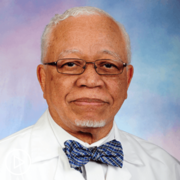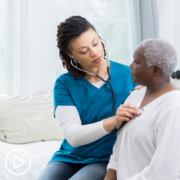Endometrial Cancer Disparities | Elevating Awareness of Diagnosis and Access Gaps
Endometrial Cancer Disparities | Elevating Awareness of Diagnosis and Access Gaps from Patient Empowerment Network on Vimeo.
How can endometrial cancer awareness be increased around diagnosis and access disparities? Experts Dr. Charlotte Gamble from MedStar Washington Hospital and Dr. Radhika Gogoi from Karmanos Cancer Institute discuss issues with provider referrals, endometrial cancer incidence rates, symptoms that need patient awareness, and how to guard against missed diagnoses.
See More from EPEP Endometrial Cancer
Related Resources:

Dr. Charlotte Gamble: Why Is It Important for You to Empower Patients? |

|

|
Transcript:
Dr. Nicole Rochester:
Dr. Gamble, can you speak to awareness? You spoke about the fact that sometimes patients are referred to perhaps the wrong provider. You know, there was that sent, you mentioned to a general surgeon instead of to a gynecologic oncologist. And so we can imagine that there may be some challenges both in the primary care setting and perhaps even among general obstetrician gynecologists.
So can you speak to how we can elevate the level of awareness to enhance healthcare provider awareness of diagnosis and access disparities and really appropriate referral patterns?
Dr. Charlotte Gamble:
Yeah, absolutely. I think it’s a tough question. I think it’s, again, like all things, it’s a little bit nuanced. Sometimes, again different levels of providers, different parts of the country, everybody practices a little bit differently. So everyone knows once you get a cancer diagnosis, you should probably go to a cancer specialist. And so generally, that’s coming to a gynecologic oncologist generally, or that’s sometimes that’s going to a medical oncologist.
But occasionally, sometimes patients will have symptoms where it’s just abnormal bleeding, and they’re seeing a general gynecologist who then does a hysterectomy, and there’s a surprise diagnosis of an endometrial cancer. Usually they’re, hopefully, they’re not making it too much to kind of the general surgery pathway our general surgery colleagues are awesome, but it’s kind of a different kettle of fish and the type of hysterectomy that’s needed and the type of specific surgery that’s needed to include lymph node assessment is different for somebody who’s getting a cancer surgery for uterine cancer compared to, let’s say, for fibroids or for adenomyosis or a non-gynecologic cancer situation.
I think, again, I’m on the receiving end of all of this, so I see patients who have made it to my doorstep and gotten kind of through the hoops and the barriers, but there’s definitely those out there that we know from the data somehow ended up with their surgery, not exactly in the appropriate hands.
And it’s hard to say, I don’t know if I actually even have advice for like how this is supposed to happen. I think we need to understand kind of the as Dr. Gogoi alluded to earlier, just kind of how prevalent endometrial cancer is right now and how the rates are rising and that abnormal bleeding has to be taken very seriously. And the thing that I harp on the most is a normal ultrasound does not mean there’s nothing else to explore there. There has to be a tissue biopsy.
And really impressing that on both patients as well as the first kind of people that they see, either their primary care doctor or even a nurse practitioner, a physician assistant. Just because there’s a normal ultrasound does not mean that your work is done. And we have studies to really demonstrate how that can delay patient’s care and missed diagnoses can happen. So it’s hard to answer your question, to like, how do we fix the referral pathway system? I don’t know the answer to that, and maybe Dr. Gogoi can speak to that, but I will say from like a screening standpoint, since there’s no great screening test, an ultrasound is not, might be the first step, but it’s definitely not the only step and it cannot be the last.
Dr. Nicole Rochester:
I appreciate that. As you were talking, I was thinking like this needs to be a major awareness campaign, not just for healthcare providers, but for patients as well.









